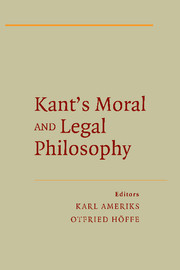
- Cited by 4
-
Cited byCrossref Citations
This Book has been cited by the following publications. This list is generated based on data provided by Crossref.
2009. Books Received. Philosophy, Vol. 84, Issue. 4, p. 631.
Maglione, Giuseppe 2014. Discursive fields and subject positions: becoming ‘victim’, ‘offender’ and ‘community’ in restorative justice. Restorative Justice, Vol. 2, Issue. 3, p. 327.
Ameriks, Karl 2017. The Cambridge Companion to German Idealism.
DiCenso, James J. 2019. Kant on Ethical Institutions. The Southern Journal of Philosophy, Vol. 57, Issue. 1, p. 30.
- Publisher:
- Cambridge University Press
- Online publication date:
- November 2009
- Print publication year:
- 2009
- Online ISBN:
- 9780511581618


